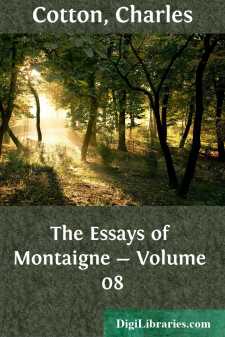Literary Collections
- American 84
- Ancient, Classical & Medieval 14
- Asian 1
- Australian & Oceanian 1
- Canadian 55
- Continental European 121
- English, Irish, Scottish, Welsh 179
- Essays 160
- General 24
- Letters 46
- Middle Eastern 1
Literary Collections Books
Sort by:
by:
Victoria Cross
CHAPTER I THE TAKU INLET It was just striking three as I came up the companion-stairs on to the deck of the Cottage City, into the clear topaz light of a June morning in Alaska: light that had not failed through all the night, for in this far northern latitude the sun only just dips beneath the horizon at midnight for an hour, leaving all the earth and sky still bathed in limpid yellow light, gently...
more...
by:
Charles Cotton
OF WAR HORSES, OR DESTRIERS I here have become a grammarian, I who never learned any language but by rote, and who do not yet know adjective, conjunction, or ablative. I think I have read that the Romans had a sort of horses by them called 'funales' or 'dextrarios', which were either led horses, or horses laid on at several stages to be taken fresh upon occasion, and thence it is...
more...
Peter “No, Antone, I have told thee many times, no, thou shalt not sell it until I am gone.” “But I need money; what good is that old fiddle to thee? The very crows laugh at thee when thou art trying to play. Thy hand trembles so thou canst scarce hold the bow. Thou shalt go with me to the Blue to cut wood to-morrow. See to it thou art up early.” “What, on the Sabbath, Antone, when it is so...
more...
by:
Alfred de Musset
ALFRED DE MUSSET A poet has no right to play fast and loose with his genius. It does not belong to him, it belongs to the Almighty; it belongs to the world and to a coming generation. At thirty De Musset was already an old man, seeking in artificial stimuli the youth that would not spring again. Coming from a literary family the zeal of his house had eaten him up; his passion had burned itself out and...
more...
by:
George Gissing
CHAPTER 1 Harvey Rolfe was old enough to dine with deliberation, young and healthy enough to sauce with appetite the dishes he thoughtfully selected. You perceived in him the imperfect epicure. His club had no culinary fame; the dinner was merely tolerable; but Rolfe's unfinished palate flattered the second-rate cook. He knew nothing of vintages; it sufficed him to distinguish between Bordeaux and...
more...
Old London!—city of cities!—whose foundations were laid when the ancient Briton in his martial glory prowled among the dense forests whose foliage darkened the waters of the Thames, long ere the foot of the adventurous Roman had touched the shores of Albion; or the Dane and Saxon had established themselves within the strongholds of the British isles. Who has not heard of this great old city,...
more...
The TURN of The TIDE "If you don't get the call you needn't come back here," said my wife to me as I stood upon the door-sill, bag in hand, and my hard-bought ticket in my pocket. "Well, dear one, I would be sure of it if they could only see the perquisite that goes along with me." "You must be more serious, Tom, if you expect great calls; but come inside a minute till I...
more...
by:
John Ruskin
PREFACE. [Pg v] The ladies to whom these letters were written have been, throughout their brightly tranquil lives, at once sources and loadstones of all good to the village in which they had their home, and to all loving people who cared for the village and its vale and secluded lake, and whatever remained in them or around of the former peace, beauty, and pride of English Shepherd Land. Sources they...
more...
by:
William Carleton
ELLEN DUNCAN There are some griefs so deep and overwhelming, that even the best exertions of friendship and sympathy are unequal to the task of soothing or dispelling them. Such was the grief of Ellen Duncan, who was silently weeping in her lone cottage on the borders of Clare—a county at that time in a frightful state of anarchy and confusion. Owen Duncan, her husband, at the period about which our...
more...
by:
George Gissing
SCHOOL There was strange disorder in Miss Rutherford's schoolroom, wont to be the abode of decorum. True, it was the gathering-time after the dinner-hour, and Miss Rutherford herself was as yet out of sight; but things seemed to be going forward of a somewhat more serious kind than a game of romps among the children. There were screams and sobbings, hysterical cries for help; some of the little...
more...











